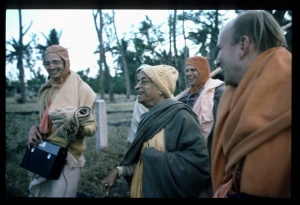CC Madhya 18.114 (1975): Difference between revisions
(Vanibot #0027: CCMirror - Mirror CC's 1996 edition to form a basis for 1975) |
(Vanibot #0020: VersionCompareLinker - added a link to the Version Compare feature) |
||
| Line 2: | Line 2: | ||
<div style="float:left">'''[[Sri Caitanya-caritamrta (1975)|Śrī Caitanya-caritāmṛta (1975)]] - [[CC Madhya (1975)|Madhya-līlā]] - [[CC Madhya 18 (1975)|Chapter 18: Lord Śrī Caitanya Mahāprabhu's Visit to Śrī Vṛndāvana]]'''</div> | <div style="float:left">'''[[Sri Caitanya-caritamrta (1975)|Śrī Caitanya-caritāmṛta (1975)]] - [[CC Madhya (1975)|Madhya-līlā]] - [[CC Madhya 18 (1975)|Chapter 18: Lord Śrī Caitanya Mahāprabhu's Visit to Śrī Vṛndāvana]]'''</div> | ||
<div style="float:right">[[File:Go-previous.png|link=CC Madhya 18.113 (1975)|Madhya-līlā 18.113]] '''[[CC Madhya 18.113 (1975)|Madhya-līlā 18.113]] - [[CC Madhya 18.115 (1975)|Madhya-līlā 18.115]]''' [[File:Go-next.png|link=CC Madhya 18.115 (1975)|Madhya-līlā 18.115]]</div> | <div style="float:right">[[File:Go-previous.png|link=CC Madhya 18.113 (1975)|Madhya-līlā 18.113]] '''[[CC Madhya 18.113 (1975)|Madhya-līlā 18.113]] - [[CC Madhya 18.115 (1975)|Madhya-līlā 18.115]]''' [[File:Go-next.png|link=CC Madhya 18.115 (1975)|Madhya-līlā 18.115]]</div> | ||
{{CompareVersions|CC|Madhya 18.114|CC 1975|CC 1996}} | |||
{{RandomImage}} | {{RandomImage}} | ||
==== TEXT 114 ==== | ==== TEXT 114 ==== | ||
| Line 20: | Line 19: | ||
<div class="synonyms"> | <div class="synonyms"> | ||
hlādinyā—by the hlādinī potency; saṁvit—by the | hlādinyā—by the hlādinī potency; saṁvit—by the samvit potency; āśliṣṭaḥ—surrounded; sat-cit-ānandaḥ—always transcendentally blissful; īśvaraḥ—the supreme controller; sva—own; avidyā—by ignorance; saṁvṛtaḥ—surrounded; jīvaḥ—the living entity; saṅkleśa—of the threefold miseries; nikara—of the multitude; ākaraḥ—the mine. | ||
</div> | </div> | ||
| Line 27: | Line 26: | ||
<div class="translation"> | <div class="translation"> | ||
" 'The Supreme Personality of Godhead, the supreme controller, is always full of transcendental bliss and is accompanied by the potencies known as hlādinī and samvit. The conditioned soul, however, is always covered by ignorance and embarrassed by the threefold miseries of life. Thus he is a treasure-house of all kinds of tribulations.' | |||
</div> | </div> | ||
| Line 34: | Line 33: | ||
<div class="purport"> | <div class="purport"> | ||
This quotation of | This quotation of Viṣṇusvāmī is cited in Śrīdhara Svāmī's Bhāvārtha-dīpikā commentary on Śrīmad-Bhāgavatam ([[SB 1.7.6]]). | ||
</div> | </div> | ||
Latest revision as of 11:02, 27 January 2020

A.C. Bhaktivedanta Swami Prabhupada
TEXT 114
- hlādinyā saṁvid-āśliṣṭaḥ
- sac-cid-ānanda īśvaraḥ
- svāvidyā-saṁvṛto jīvaḥ
- saṅkleśa-nikarākaraḥ
SYNONYMS
hlādinyā—by the hlādinī potency; saṁvit—by the samvit potency; āśliṣṭaḥ—surrounded; sat-cit-ānandaḥ—always transcendentally blissful; īśvaraḥ—the supreme controller; sva—own; avidyā—by ignorance; saṁvṛtaḥ—surrounded; jīvaḥ—the living entity; saṅkleśa—of the threefold miseries; nikara—of the multitude; ākaraḥ—the mine.
TRANSLATION
" 'The Supreme Personality of Godhead, the supreme controller, is always full of transcendental bliss and is accompanied by the potencies known as hlādinī and samvit. The conditioned soul, however, is always covered by ignorance and embarrassed by the threefold miseries of life. Thus he is a treasure-house of all kinds of tribulations.'
PURPORT
This quotation of Viṣṇusvāmī is cited in Śrīdhara Svāmī's Bhāvārtha-dīpikā commentary on Śrīmad-Bhāgavatam (SB 1.7.6).